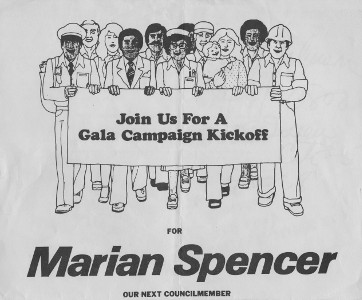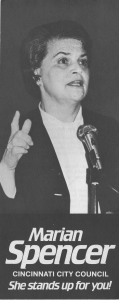Campaigning for a Council Seat
In 1983, Marian Spencer won election to the Cincinnati City Council. She was the first ever African American woman to accomplish this feat. Spencer officially kicked off the campaign in her home neighborhood of Avondale on June 11, 1983. The Gala Campaign event, held at the Avondale Town Center, featured former NBA all-star Oscar Robertson, Theodore Berry (Cincinnati’s first African American mayor), and Ohio Representative William L. Mallory, along with  many other local luminaries. Guests were treated to live music and refreshments while the campaign registered 200 voters during the celebration. Increasing voter registration remained a focal point of Spencer’s campaign. She ran as a member of the local Charter party, but received the support and endorsement of the Democrats as well.
many other local luminaries. Guests were treated to live music and refreshments while the campaign registered 200 voters during the celebration. Increasing voter registration remained a focal point of Spencer’s campaign. She ran as a member of the local Charter party, but received the support and endorsement of the Democrats as well.
Spencer’s platform fought for equal rights and social justice for all Cincinnatians. Her reputation as a tough advocate for equality in the community with the NAACP, the Woman’s City Club, and the U.S. Civil Rights Commission served as a major campaign talking point. The campaign’s slogan, “She stands up for you,” evoked her experience in community activism. The Spencer Campaign argued that their candidate would work for fair utility rates, neighborhood development, civil rights, and a quality education for the city’s citizens. Spencer wrote in campaign literature that she has “always stood up for the concerns of the poor, minorities, and women in our community. On the campaign trail, I have been talking about the need for quality low-income housing…fair utility rates and home weatherization funding.”
The campaign distributed a newsletter, The Spencer Advocate, to supporters throughout the election. The newsletter urged supporters to volunteer with the campaign distributing literature, registering voters, and holding neighborhood parties. Spencer solicited donations and funding from many of the connections she and her husband, Donald, had made throughout the Cincinnati community. Their supporters belo nged to organizations such as the Friends of Cincinnati Parks, the Women’s City Club, Ohio University, the Charter Committee, and black churches throughout the city.
nged to organizations such as the Friends of Cincinnati Parks, the Women’s City Club, Ohio University, the Charter Committee, and black churches throughout the city.
The Spencer for City Council Campaign knew that their primary voting blocks included blacks, organized labor, teachers, senior citizens, and church members. However, their strategy was not only about attracting Democratic and black voters; Marian wanted and needed the support of some white, Republican Cincinnatians in order to win. To attract the support of white Republicans (especially women), Marian discussed her priorities on safety, police, and women’s issues. Marian gave radio and television interviews throughout the campaign and spoke with a diverse coalition of interest groups ranging from the Cincinnati Board of Realtors to the Harriet Tubman Black Women’s Democratic Club. Ultimately, her strategy and hard work paid off. Marian Spencer won election to the Cincinnati City Council, the first African American woman ever to do so. The Marian Spencer Papers at the University of Cincinnati provide a wealth of information on Spencer’s historic city council campaign.